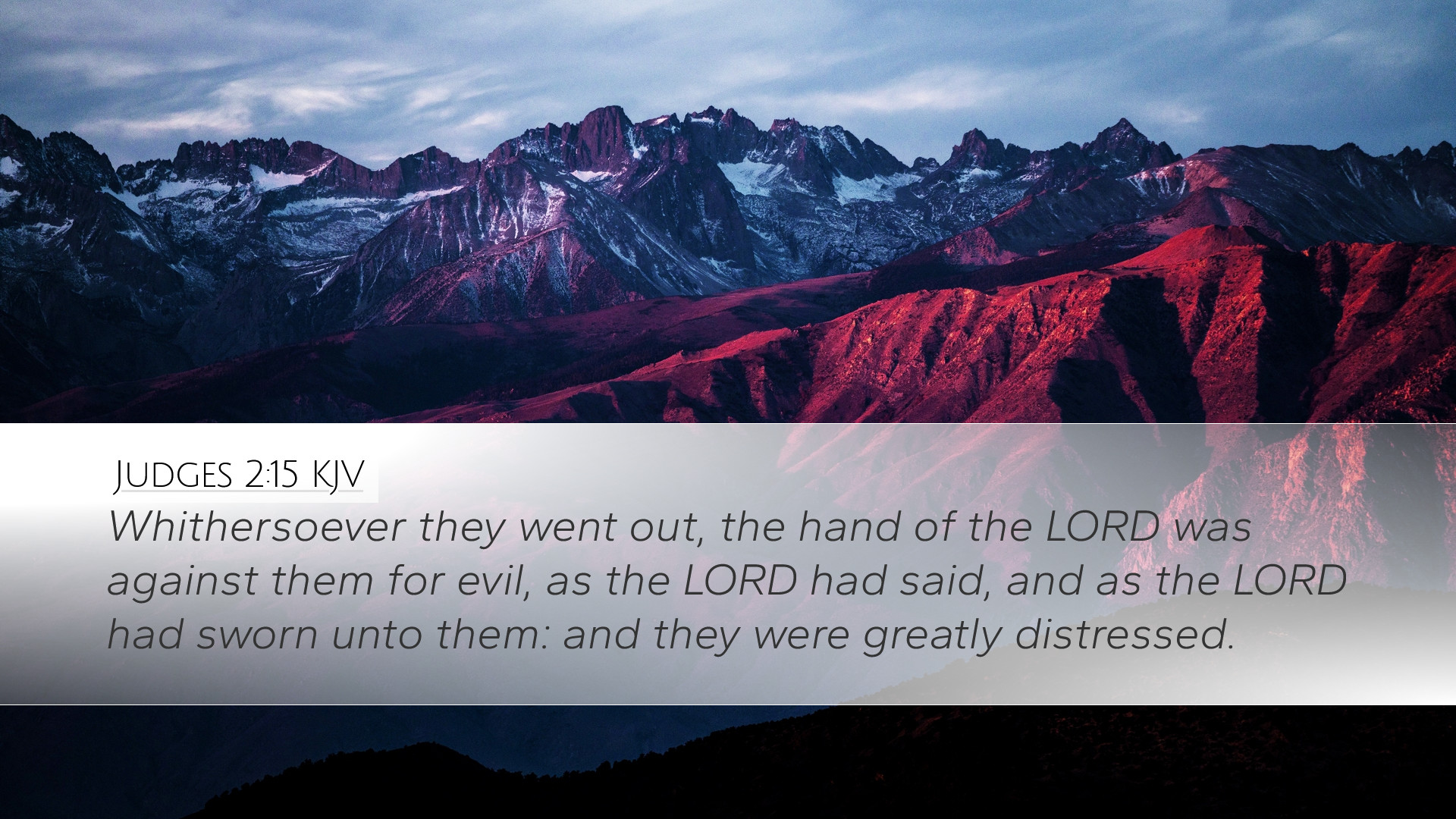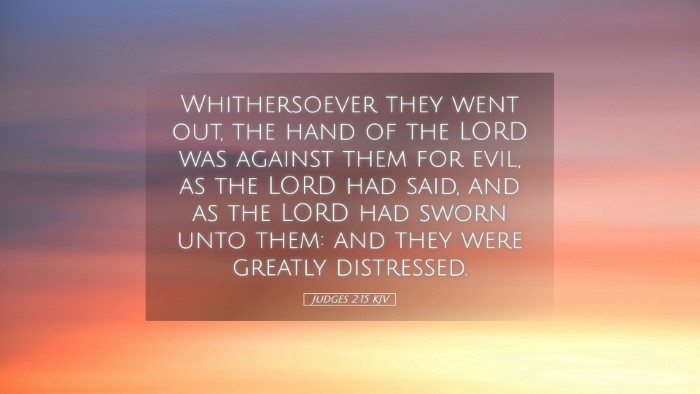Old Testament
Genesis Exodus Leviticus Numbers Deuteronomy Joshua Judges Ruth 1 Samuel 2 Samuel 1 Kings 2 Kings 1 Chronicles 2 Chronicles Ezra Nehemiah Esther Job Psalms Proverbs Ecclesiastes Song of Solomon Isaiah Jeremiah Lamentations Ezekiel Daniel Hosea Joel Amos Obadiah Jonah Micah Nahum Habakkuk Zephaniah Haggai Zechariah MalachiJudges 2:15
Judges 2:15 KJV
Whithersoever they went out, the hand of the LORD was against them for evil, as the LORD had said, and as the LORD had sworn unto them: and they were greatly distressed.
Judges 2:15 Bible Commentary
Commentary on Judges 2:15
Judges 2:15 states, "Whithersoever they went out, the hand of the Lord was against them for evil, as the Lord had said, and as the Lord had sworn unto them: and they were greatly distressed." This verse encapsulates a crucial moment in the history of Israel, marking the consequences of their unfaithfulness to God and serves as a poignant reminder for leaders and scholars alike to reflect on the divine principles that govern His covenant with His people.
Contextual Analysis
The Book of Judges portrays the cyclical pattern of Israel's disobedience, oppression, repentance, and deliverance. This cycle reflects the broader themes of God's patience and justice. In Judges 2:15, we see the ultimate consequence of rejecting God's covenant—His hand of judgment. The historical context reveals that after Joshua's death, without strong leadership, the Israelites fell into idolatry and failed to fulfill God’s commandments regarding the conquest of the Promised Land.
Theological Insights
This verse highlights several theological themes that are critical for understanding God's relationship with His people:
- Divine Judgment: The reference to "the hand of the Lord was against them" signifies God's active role in enforcing justice upon His people when they stray from His commands. It serves as a warning of the repercussions of sin, reflecting the covenant's conditional nature.
- Divine Sovereignty: The phrase "as the Lord had said, and as the Lord had sworn unto them" underscores God's unchangeable nature. His promises are binding, both for blessings and for curses, depending on Israel's covenant faithfulness.
- Distress and Suffering: The declaration that "they were greatly distressed" illustrates the emotional, spiritual, and physical turmoil that follows sin. This distress is not merely a punishment but a cause for repentance and a return to the Lord.
Commentary Excerpts
Matthew Henry
Matthew Henry notes that the consequences of Israel's disobedience are not just calamities but a reflection of God's displeasure. He emphasizes that God's challenges serve to take Israel back to a rightful relationship with Him. Henry characterizes this distress as a means to lead the people into repentance, urging that sin leads ultimately to suffering.
Albert Barnes
Albert Barnes expounds on the phrase "the hand of the Lord was against them," explaining that divine opposition serves both as punishment and a call to turn back to righteousness. Barnes points out that the enemies of Israel were allowed to prevail as a direct consequence of Israel's failure to heed God's commands. He insists that unwavering faith is the only safeguard against divine wrath.
Adam Clarke
Adam Clarke focuses on the cyclical nature of Israel's relationship with God, detailing how each cycle represents a deepening of either faithfulness or apostasy. He notes that the "greatly distressed" condition of the people is a significant indicator of God's disfavor and serves as a crucial moment for Israel’s leaders to take note of their failures. Clarke encourages readers to understand that God’s justice is meant to draw them back into a faithful relationship.
Practical Applications
For pastors, students, and theologians, Judges 2:15 is rich with implications for both leadership and personal faith:
- Encouragement to Maintain Faithfulness: The verse is a stark reminder of the importance of remaining true to God’s principles. Leaders should reinforce the necessity of fidelity to God’s word within their communities.
- Awareness of Spiritual Condition: The text encourages self-examination of one’s walk with God. Faith communities should foster environments where accountability and repentance are practiced regularly.
- Understanding God’s Discipline: The reflection on divine judgment teaches that suffering can serve a purpose. It can lead to greater dependence on God and a renewed commitment to His covenant.
Conclusion
Judges 2:15 serves as a profound reminder of the serious nature of covenant faithfulness and the consequences of turning away from God. Through the insights gleaned from public domain commentaries, we see that God's discipline is an invitation to restoration rather than merely a punitive action. As we engage with this text, let us consider how it speaks to the heart of our relationship with the Lord and the community of believers.


